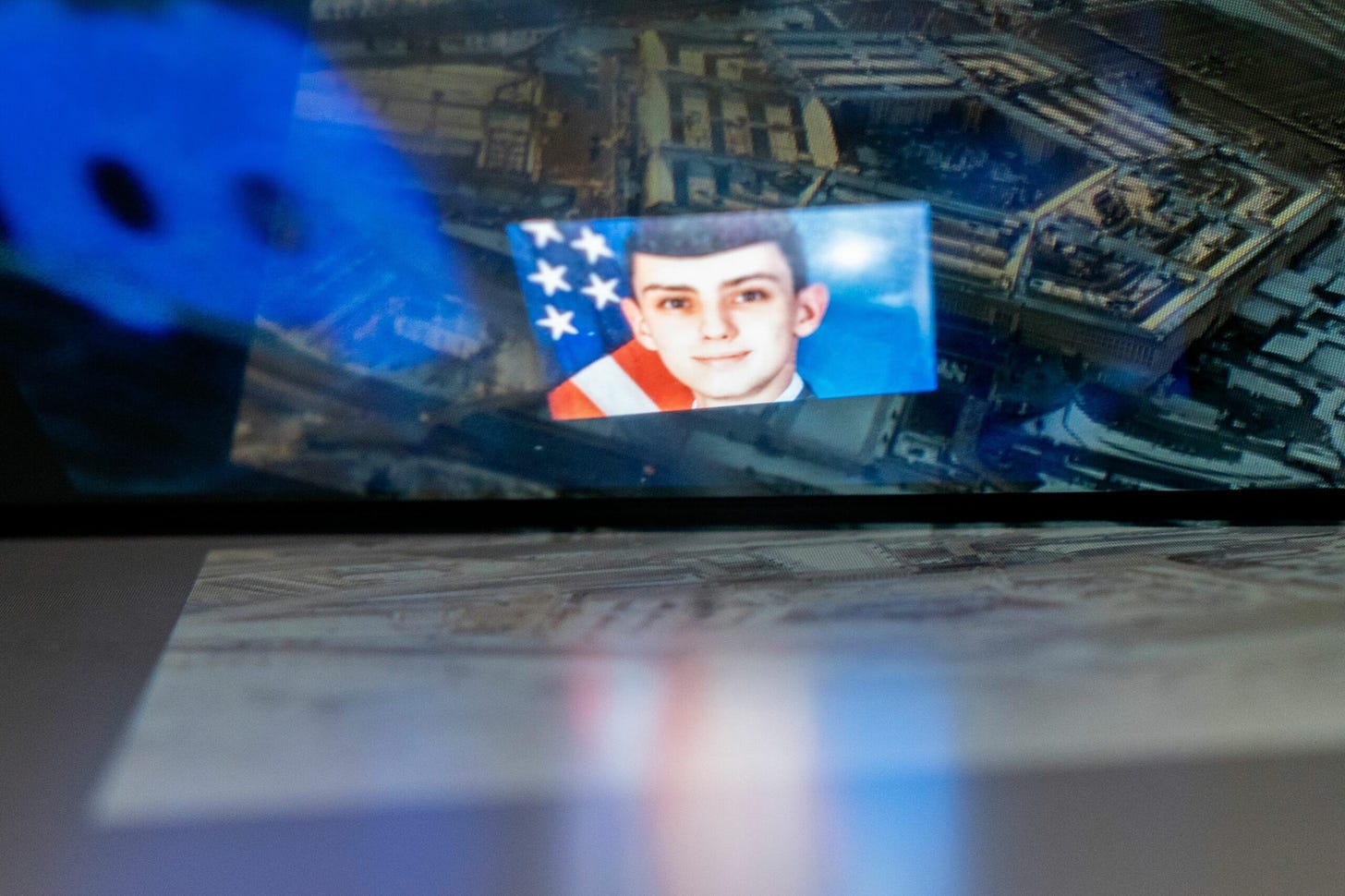Dumb Leaks and Dumb Luck
Many famous leakers of military and governmental secrets have acted on principle. The alleged Discord leaker, Jack Teixeira, is not among them.

According to the late physicist Stephen Hawking, whom no one ever accused of being a dunce, our past is mostly “the history of stupidity.” That may or may not be a true claim. But the actions of Jack Teixeira, the Air National Guardsman who allegedly leaked a stupendous array of American governmental and military secrets, would appear to corroborate Hawking’s judgment.
The 21-year-old airman—now under arrest on charges of violating two laws that protect sensitive information, one of them being the Espionage Act—was not acting as a foreign agent, seeking to provide succor to an American adversary either for pay or out of ideological conviction. Nor was he a whistleblower, acting to bring malfeasance to light. He evidently had no higher purpose than to impress a group of teenage gamers in a chat group on the social platform Discord. Stupidity squared.
One finds further stupidity in the actions of the authorities who cleared Teixeira for access to top secret and sensitive-compartmented information.
According to court documents, in March 2018 while still in high school, Teixeira “was suspended when a classmate overheard him make remarks about weapons, including Molotov cocktails, guns at the school, and racial threats.” That same year, Teixeira had applied for a firearms permit. His application was denied “due to the concerns of the local police department over the Defendant’s remarks at his high school.” Red flags were flying all around. Pentagon investigators cleared him to handle classified materials anyway.
Brainlessness can also be found in the judgment of Rep. Marjorie Taylor Greene of Georgia. Jack Teixeira, she pronounced in a tweet, “is white, male, christian [sic], and antiwar. That makes him an enemy to the Biden regime.” The high station of this woman—whose malapropisms include referring to the Gestapo, the secret police of Nazi Germany, as the “gazpacho police”—is further proof of Hawking’s hypothesis.
Teixeira stands in stark contrast to the epic leakers of the modern era. Daniel Ellsberg, who leaked the multivolume Pentagon Papers, took great personal risks in his effort to bring the Vietnam War to an end. Chelsea Manning, the Army private who provided a huge trove of secrets to Julian Assange’s Wikileaks, aimed to expose American crimes in the war in Iraq. Edward Snowden, the National Security Agency contractor who fled to Moscow with a massive cache of top secret data, sought to bring to light what he regarded as an unlawful NSA surveillance program. One may regard Ellsberg, Manning, and Snowden as heroes or villains, but they were in something of a classic American tradition of leaking: They had a coherent point of view, and they acted purposefully to advance a cause.
It was not always thus. If we reach all the way back to World War II, we find equivalents to Teixeira’s monumental idiocy in the realm of secrets.
Andrew Jackson May was a congressman, a Democrat from Kentucky, from 1931 to 1947. During the war, he became the influential chairman of the House Military Affairs committee. In the summer of 1943, as war was raging with Japan, May and a group of congressmen went on a tour of the Pacific theater. During their travels they received classified briefings on the conduct of the war. Upon his return, May gave a press conference in which he indiscreetly repeated some of what he had learned.
American submarines patrolling the Pacific to destroy enemy shipping were secure, May revealed, because the Japanese were setting their anti-submarine depth charges at too shallow a depth to damage them. May’s comments made it into a number of newspapers and may have been picked up by the Japanese, who adjusted their depth charges accordingly, setting them to detonate at a lower depth. At least that was what the commander of the U.S. submarine fleet in the Pacific, Vice Admiral Charles Lockwood, believed.
Lockwood wrote to another officer: “I hear . . . Congressman May said the Jap depth charges . . . are not set deep enough. He would be pleased to know the Japs set ’em deeper now.” According to Lockwood, May’s senseless revelation led, in his estimation, to the loss of ten U.S. submarines and 800 seamen. Stupidity—plus criminality—cubed.
Even more recklessly, if that is possible, on June 7, 1942, on the final day of the decisive battle of Midway, the Chicago Tribune published a story headlined “Navy Had Word of Jap Plan to Strike at Sea, Knew Dutch Harbor Was Feint.” Claiming to have received information from “reliable” American naval intelligence sources, the Tribune reported that the “strength of the Japanese forces which the American Navy is battling somewhere west of Midway Island” was known in naval circles days before the fateful engagement started. The story then provided a veritable inventory of the Japanese forces arrayed against the United States there, down to the ships’ individual tonnages and armaments.
Obviously, the United States had broken Japanese naval codes. And now everyone who picked up a copy of the Chicago Tribune could know it.
No public interest was served by this leak. To the contrary, it risked a disaster of the greatest magnitude. Running the story was a case of sheer journalistic mindlessness in a time of war. If the Japanese changed their codes, the United States would have been blinded, the curtains drawn over its crucial window on Japanese operational planning. The war in the Pacific might have been indefinitely prolonged, causing the needless deaths of countless additional American servicemen.
But the Japanese themselves, though certainly aware of the story, did not change their codes or alter their behavior a whit. They succumbed to another form of stupidity, the one known as hubris. David Kahn, in his seminal book The Codebreakers, offers his best conjecture:
The Japanese trusted too much to the reconditeness of their language for communications security, clinging to the myth that no foreigner could ever learn its multiple meanings well enough to understand it properly. In part, they would not envision the possibility that their codes might be read. . . . In any event, they hypnotized themselves into the delusion that their codes were never seriously compromised.
In the end, the Chicago Tribune escaped any criminal liability for its dangerous disclosure. American authorities were reluctant to call further attention to a story the Japanese were thought to have missed. In 1947, Congressman May was sentenced to up to two years in prison, but that was not for leaking, for which he went unpunished. It was for bribery. He served only nine months. Unaccountably, he was pardoned by President Truman in 1952.
Jack Teixeira faces up to 25 years imprisonment. Reality Winner was sentenced to five years for her leak of a single document about Russian election interference to the press; Chelsea Manning’s 35-year sentence was commuted after 7; Joshua Schulte, convicted last year of leaks from the CIA, faces up to 80 years. Even just a few years in prison is a hard price to pay for one’s principles, but it is a far dearer cost when it is owed for one’s stupidity.





